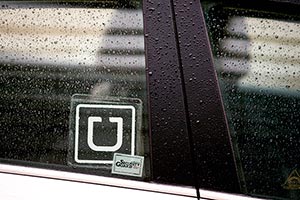Package Delivery Companies Could Face New Challenge From Uber

Europe's postal companies, already under pressure from Amazon.com Inc., soon could face a challenge from Uber, which is moving into deliveries, and other startups.
UberRUSH — run by Uber but connecting you to a courier rather than a taxi — and new entrants such as PiggyBaggy and Nimber, could dent the market share of operators such as Royal Mail, Deutsche Post and PostNL, equity analysts and investors told Reuters.
They are beginning to factor in a longer-term impact on the stock values of these incumbents, which have been hit by Seattle-based Amazon shifting from customer to competitor by starting its own delivery services in parts of Europe.
They see this as a harbinger of what lies in store for Europe's parcel delivery firms if Uber follows suit.
The UK's Royal Mail has said Amazon's move will more than halve the growth potential for its parcel business — accounting for half of its approximately 9.5 billion pounds ($13.7 billion) revenues — for at least a few years.
Meanwhile, Credit Suisse analysts estimate that if Amazon delivered half of its own parcels in three to five years, it could mean an annual 3% to 5% revenue loss for Deutsche Post arm DHL's parcel business.
The possibility of Uber moving into postal delivery in Europe, as it has done in some U.S. cities, and the emergence of other firms relying on people rather than companies to deliver parcels in a cheaper and faster way, is seen as another drag on Deutsche Post, PostNL and Royal Mail shares, which are down 3% to 20% this year.
"UberRUSH would be another potential competitor trying to take a slice of the pie, which would no doubt put further pressure on companies like Royal Mail when same-day delivery grows in importance," said David Kerstens, European transport and logistics analyst at Jefferies.
Uber says it "currently" has no plans to start UberRUSH in the U.K., but analysts said it was just a matter of time before it launched elsewhere, given the rapid growth of its taxi service.
If Uber were to capture 10% of the U.K.'s courier market, it would translate into a 700 million -pound income for just one country, according to a report by delivery company ParcelHero, which says the global courier and parcel sector generates about $250 billion in revenues each year.
The other threat comes from firms such as Finland's PiggyBaggy, which is eying Denmark and Germany, and Norway's Nimber. Both connect customers willing to pay people who are traveling to the same destination to deliver their parcels.
Nimber has 27,000 registered users since starting in Britain seven months ago and is targeting about 100,000 by the end of the year.
DHL, PostNL and Royal Mail expressed confidence when asked how they would tackle these new challenges, with some pointing out that they already were were developing similar operations.
DHL said that for traditional providers, crowdsourced delivery companies meant more competition but also offered an opportunity. It has tried delivering parcels in Stockholm by involving local residents and is considering a second program.
A Royal Mail spokesman said new entrants were adding to the options to consumers mainly in the same-day segment, in which it was also a sizable player, while PostNL said it welcomed competition, but believed in the strengths of its own business.
But for some, this optimism is overdone.
Gary Paulin, co-founder of brokerage Aviate Global, said Royal Mail was one of his favored "short" plays, while Redmayne-Bentley investment manager David Battersby also saw the European postal firms losing their market dominance.
"The traditional postal companies will not disappear but with the competition coming in, I don't see how they can maintain their iron-like grasp on the market," Battersby said.

